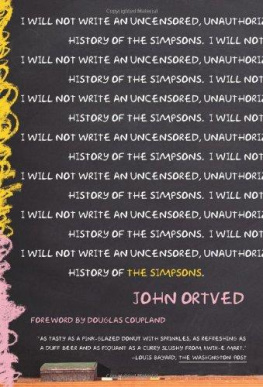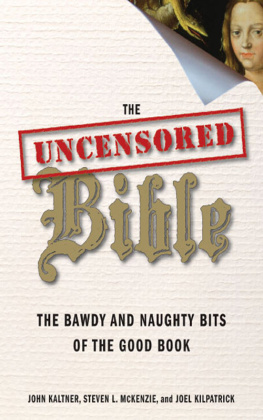The Room
In which the West Side Pavilion Mall is the first Simpsons writing room Conan OBrien invents a sport The Simpsons hires a black guy (not really) and Jim Brooks wants blood.
Hes probably some geek Simpsons writers kid.
Michael Bluth, Arrested Development
The Simpsons writers room, where scripts are devised, written, and edited, has come to be considered one of the great temples of comedy. Although many of the original writers had substantial television credits, Sam Simon plucked spectacular talent from nontraditional places, beginning a trend that would continue long after his departure (subsequent showrunners hired mathematicians and lawyers). Perhaps his key find was George Meyer, editor of the humor magazine Army Man distributed sparingly in Hollywood in the late eighties and somewhat of a shibboleth in the comedy-writing community. In 1991, Conan OBrien, one of many Harvard Lampoon veterans on the staff, Bill Oakley, and Josh Weinstein would be the first writers to be added to the original room.
Writing is important to any sitcom, but on an animated series there would be beautiful actors or topical humor to keep the viewers enthralled, so the writing room carried special significance at The Simpsons. It is important to remember that this was before the likes of David Chase ( The Sopranos ), Ricky Gervais ( The Office ), Alan Ball ( Six Feet Under ), Mitchell Hurwitz ( Arrested Development ), and Aaron Sorkin ( The West Wing ) made television something closer to a respectable medium for writers. This was the era of Full House and Family Matters , where smart, incisive, funny writing was hardly prevalent. Late Night with David Letterman , Roseanne , and Cheers were anomalies in an otherwise dismal comedy landscape.
For the first four or five seasons Sam Simons writers room not only created the best episodes of The Simpsons but also established the shows inimitable voice. Over the years, many of the shows critics and commentators have tried to define that voicea combination of rebellious, ironic, highbrow, silly, crude, intertextually hyperactive, iconoclastic, sly, witty, and retarded. The men in that roomNell Scovell is the only woman with a writing credit from the initial seasonsbuilt a family sitcom that was not only funny but also resonant, first with kids, then critics, and then everybody else, for the next twenty years. If The Simpsons has reshaped what we find funny and how we communicate, the writing room and its workings are worth examining, because it is the touchstone of The Simpsons universe .
The original room included Sam Simon, Al Jean, Mike Reiss, Jace Richdale, Jon Vitti, George Meyer, John Swartzwelder, Jay Kogen, Wallace Wolodarsky, Jeff Martin, and Matt Groening (sort of).
CONAN OBRIEN, writer/producer, The Simpsons (199193) (when he was asked to join the room after Season 2): It was as if that first Olympic Dream Team, with Larry Bird and Magic Johnson, called and said, Do you want to come shoot baskets with us?
BILL OAKLEY, writer/producer, The Simpsons (199197): It was like being hired at Saturday Night Live in 1977. It was like going to work at Your Show of Shows in 1955, when you had Mel Brooks and Neil Simon and all those guys there on the writing staff. The show was at its absolute height and it was all the original guys and Conan.
JAY KOGEN, writer/producer, The Simpsons (198992): We were on board even before there was a writers room. Wallace Wolodarsky and I would walk around the West Side Pavilion Mall with Matt Groening and Sam Simon and pitch out a show. Sometimes wed go to lunch; it would just be the four of us.
DARIA PARIS, Sam Simons assistant, The Simpsons (198993): Thered be usually four or five writers in Sams office, and wed go through the script and they would change things, pitch ideas, that kind of thing. And basically out of that theyd fashion a script. At the time, Jim Brooks was in Ireland, I think, and he would call in and we would take notes from him and then incorporate them. Jim was more of a consultanthed get a script, hed call, hed send notes or whatever. He was not usually in the room.
BRIAN ROBERTS, editor, The Simpsons (198992): Jim was never around a lot. Matt was around, but he was isolated and not really a part of the inside gang. Jim would come, though. And the thing that I really credit Jim with, and I dont think theres anybody who would argue with this, is that he would give the family some heart.
Jims thing was that deep down they really loved each other. Deep down, I think Jim understood that if they didnt truly love each other, at the end of the day, nobodys gonna watch.
And so hed come in and hed sprinkle his fairy dust in little places here and there, to the great improvement of the show. And thats where I think Jims contribution begins and ends on The Simpsons . And thats no small contribution.
HANK AZARIA, voice actor, The Simpsons (1989present): Fox had two hits: they had The Simpsons and they had Married with Children , and The Simpsons was very believable and Married with Children was more like a cartoon. And there are episodes, I think particularly the Lisa episodes, where they really involve the journey of a little girl and what would realistically happen; those are beautiful, realistic little stories.
I think of Matts Life in Hell cartoon. Its very cynical, but its got a lot of emotion at the same time. Its usually very negative. Like those Jeff and Akbar cartoons: theyll have very realistic arguments with each other about pretty deep, interesting issues, and theyre both kind of unattractive and yet we relate to them so much that we feel a lot for them. I think thats what really what Matt brought. You know, the family of The Simpsons theyre so flawed and kind of ugly that we all relate because we all have a dysfunctional family of our own.
SAM SIMON, creative consultant, The Simpsons (198993) (to Joe Morgenstern in the Los Angeles Times , 1990): If you bring up any subject in a story conference, if its a field trip, or what its like to go to the nurses office, or what its like to be called in by the principal, [Matts] recall is near total and astonishing. I think thats a real rare talent.
WALLACE WOLODARKSY, writer/producer, The Simpsons (198992): Matt had an incredible ability to recount events from his childhood and also events and feelings that were resonant with us from childhood. It made him an endless source of amusement. In the early days, we didnt really care that much about stories, and Jim insisted that we tell real human stories, and so did Sam. What I cared about was telling jokes.
COLIN A.B.V. LEWIS, postproduction supervisor, The Simpsons (198997): George Meyer was this long-haired guy. Swartzwelder was this big tall Sasquatch sloppy guy. Vitti always was in cords and a nice shirt, almost looking like a substitute teacher. Al Jean wore high school basketball shorts like Cousy used to wear, and inappropriately tight clothes. Youd see all these guys and you had no idea; you would talk to them and have really intelligent conversations about politics and art. Youd go to parties with them and they were regular guys. If you talk to a writer on any show, somehow hell guide you toward, What do you do? What show are you on? And with The Simpsons writers, it was the opposite. They were guys who were having fun, doing what they were doing and making a good show, but they were the geekiest, most unassuming guys.
DARIA PARIS: It was usually the same people in the room. At the time it was a fairly small writing staff, and they were just great and very different. Jon Vitti, very quiet. John Swartzwelder wasnt very quiet. And then everybody pitched in, including me. And the great thing about Sam as a showrunner was that no matter where it came from, if it was funny, he took it.




